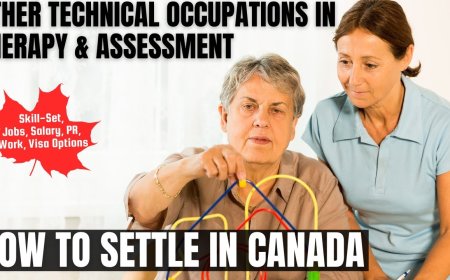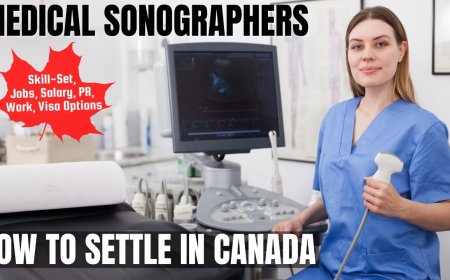Registered nurses and registered psychiatric nurses Canada Immigration Pathways: Understanding Salaries, Work Roles, and Best Provinces
Welcome to the pathway to Canada immigration for skilled professionals and trade workers. This guide is specifically tailored for Registered nurses and registered psychiatric nurses looking to work and settle in Canada, offering a deep dive into the essential aspects of immigration and employment in this field.
Introduction
In recent years, Canada has been facing a shortage of Registered nurses and registered psychiatric nurses, making it a highly in-demand profession for immigrants looking to build a successful career in the healthcare sector. In this article, we will be providing an in-depth look at the career and immigration prospects for Registered nurses and registered psychiatric nurses in Canada. We will cover the profile description, main job duties, education and licence requirements, skills required, median and retirement age, salary details, and possible visa options for those looking to relocate to Canada for work.
What is the Profile Description of a Registered nurses and registered psychiatric nurses as per the Canadian National Occupation Classification (NOC) Standards?
Registered nurses, registered psychiatric nurses, and graduate nurses awaiting registration provide direct nursing care to patients, deliver health education programs, and offer consultative services related to nursing practice. They work in various settings such as hospitals, nursing homes, rehabilitation centers, clinics, and private homes. They may also provide care in community agencies, corporations, and other organizations, or work as independent contractors.
What are the Main Job Duties of a Registered nurses and registered psychiatric nurses in Canada?
- Assess patients to identify appropriate nursing interventions, collaborate with health team, and plan patient care
- Administer medications, monitor patient symptoms, and operate medical equipment
- Assist in medical procedures, develop discharge planning processes, and provide patient education
- Specialize in various areas of nursing such as surgery, obstetrics, psychiatric care, and community health
- Conduct research, provide nursing consultancy, and deliver leadership in specific patient care areas
What are the Education, Certifications, and Licensing Requirements to Work as Registered nurses and registered psychiatric nurses in Canada?
Registered nurses typically need to complete a registered nursing program through a university, college, or other approved institution. Additional specialization in a specific area of nursing may require further academic training or experience. Clinical nurse specialists, clinical nurses, nursing consultants, and nursing researchers typically need a master's or doctoral degree in nursing. Registration with a regulatory body is mandatory in all provinces and territories. Registered psychiatric nurses must complete a registered psychiatric nursing program through a university or college. In order to practice, registration with a regulatory body is necessary in Manitoba, Saskatchewan, Alberta, British Columbia, and the Yukon.
What Essential Skills are Required for Registered nurses and registered psychiatric nurses to succeed in Canada?
In order to be successful in the professions of registered nurses and registered psychiatric nurses, essential skills include the ability to assess patients for appropriate nursing interventions, operate and monitor medical equipment, provide counselling and life skills programming, offer nursing care, consult on nursing issues, assist in medical procedures, participate in community assessments and program development, monitor and document patient symptoms and changes, manage home care cases, conduct nursing-related research, collaborate on patient care plans, dispense medications as prescribed, deliver immunization and health education programs, conduct disease screenings, and supervise nursing staff. These professionals must possess a wide range of medical and interpersonal skills to effectively care for patients in a variety of healthcare settings.
What is the Median Age and Retirement Age for Registered nurses and registered psychiatric nurses in Canada?
Registered nurses and registered psychiatric nurses have a median age of 41 years old, with the average retirement age being 61. This suggests that professionals in these fields tend to have a long and fulfilling career, with many choosing to work well into their 60s before retiring. The high retirement age could be reflective of the dedication and passion that individuals in these roles have for their work, as well as the increasing demand for skilled healthcare professionals in the industry. Overall, these statistics highlight the commitment and longevity of careers in nursing, showcasing the value that these professionals bring to the healthcare system.
How many job openings exist for Other Registered nurses and registered psychiatric nurses in Canada, and what's their provincial distribution?
The total job openings for Registered nurses and registered psychiatric nurses in Canada is 692. Saskatchewan has the highest number of job openings with 271 positions available, followed by Quebec with 189 openings. British Columbia has 86 job openings, Ontario has 71, Manitoba has 22, Newfoundland and Labrador has 20, Nova Scotia has 15, Alberta has 7, and New Brunswick has 6 job openings. Saskatchewan has the maximum job openings, while New Brunswick has the minimum number of job openings. This data indicates a significant demand for registered nurses and registered psychiatric nurses across various provinces in Canada.
What is the hourly wage or salary of Registered nurses and registered psychiatric nurses in different Provinces of Canada?
Registered nurses and registered psychiatric nurses in Canada can expect to earn varying wages depending on the province in which they are employed. In Nunavut, nurses earn some of the highest wages in the country, with a high wage of $86.69, a median wage of $67.83, and a low wage of $34.94. Similarly, nurses in the Northwest Territories also earn high wages, with a high wage of $72.57, a median wage of $55.74, and a low wage of $38.44. On the other hand, nurses in provinces like Quebec and New Brunswick earn lower wages, with a high wage of $44.00 and $43.25 respectively, a median wage of $35.00 and $39.00, and a low wage of $23.00 and $23.24. Nurses in British Columbia, Alberta, and Saskatchewan earn wages that fall somewhere in between, with British Columbia having a high wage of $46.00, Alberta with a high wage of $50.59, and Saskatchewan with a high wage of $48.50. Overall, nurses in Canada can expect to earn competitive wages, with the potential for higher earnings in provinces like Nunavut and the Northwest Territories, while still making a comfortable living in other provinces across the country.
What are the various visa options available for Registered nurses and registered psychiatric nurses migrating to Canada?
Registered nurses and registered psychiatric nurses are currently in high demand in Canada, making them eligible for Category-based Express Entry Invitation draws for Canadian Permanent Residency under the Healthcare Occupations Category. Express Entry is a system used by the Canadian government to manage applications for permanent residence for skilled workers. In addition to Express Entry, Registered nurses and registered psychiatric nurses can also explore Provincial Nominee Programs and Employer Sponsored Work Visas as potential migration options. There may be other visa options open for this profile as well. To learn more about the migration options available for Registered nurses and registered psychiatric nurses, book an appointment with our professionals to discuss your options in detail.
Have Questions or Need Assistance?
If you have any queries or require assistance with your immigration plans, we're here to help. Our experienced immigration consultants are ready to provide personalized guidance tailored to your specific needs.
Don't hesitate to reach out and schedule an appointment today. Whether you're seeking clarification on immigration processes, exploring visa options, or need support with documentation, we're dedicated to assisting you every step of the way.
Book an appointment with our team to discuss your immigration goals and receive expert guidance for your journey to Canada.
What's Your Reaction?
 Like
0
Like
0
 Dislike
0
Dislike
0
 Love
0
Love
0
 Funny
0
Funny
0
 Angry
0
Angry
0
 Sad
0
Sad
0
 Wow
0
Wow
0






































































